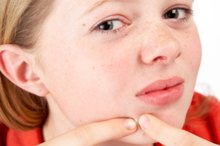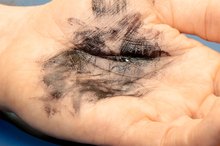About Rubbing Alcohol on Acne Skin
Rubbing alcohol is commonly used as a disinfectant to soothe skin and clean off bacteria and other pollutants. It is also considered to be helpful in healing acne by virtue of its cleansing properties though this has not been proven through any medical research. Most people use rubbing alcohol as an alternative for expensive anti-acne astringents or toners, where rubbing alcohol is the base agent combined with other acne healing ingredients, such as clove or tea tree oil. Alternative health forums and websites caution against using rubbing alcohol on acne-prone skin for a prolonged period of time since it may cause skin irritation resulting in painful skin peeling.
Benefits
Rubbing alcohol is used for a variety of problems as a popular home remedy. In addition, rubbing alcohol is also useful in getting rid of fruit flies. According to Health Tree, rubbing alcohol helps dry the skin and cleans off acne-causing bacteria 1. It is also helpful when you notice the first signs of a pimple since cleaning the area three times a day with rubbing alcohol will considerably reduce blackheads and pimples.
- Rubbing alcohol is used for a variety of problems as a popular home remedy.
- In addition, rubbing alcohol is also useful in getting rid of fruit flies.
Problems
How to Best Treat an Underground Pimple
Learn More
The Material Safety Data Sheet has ranked rubbing alcohol quite high on its list of skin irritants. Ingestion of rubbing alcohol can cause liver poisoning, resulting in nausea and dizziness. Some schools of thought are strictly against the use of rubbing alcohol for acne while others consider it OK to use in a limited manner. However, no one is really certain about the amount of rubbing alcohol that can be considered healthy for the skin.
- The Material Safety Data Sheet has ranked rubbing alcohol quite high on its list of skin irritants.
- Some schools of thought are strictly against the use of rubbing alcohol for acne while others consider it OK to use in a limited manner.
Effects
People with sensitive skin should avoid using rubbing alcohol because it can cause dryness and peeling. This dryness can cause the skin to produce more oil, worsening the acne problem. It is also known to affect eyesight.
Considerations
Home Remedy for an Infected Pimple
Learn More
Typically the ethanol content in rubbing alcohol varies between 70 percent and 90 percent, depending on the manufacturer. Health Tree recommends cleaning your face with rubbing alcohol no more than once a day while it can be used locally to heal a pimple three times a day. However, if you see your skin condition worsening, then you must switch to a proven anti-acne cure -- medical or homemade.
Tips
To create a homemade astringent, rubbing alcohol can be mixed with tea tree oil or clove oil for better results. You should always consult with your doctor before beginning any home remedy for acne.
Related Articles
References
- Health Tree: Homemade Acne Treatment
- National Institute of Arthritis and Musculoskeletal and Skin Diseases (NIAMS). Acne. Updated September 2016.
- Zaenglein AL, Pathy AL, Schlosser BJ, Alikhan A, Baldwin HE, et. al. Guidelines of care for the management of acne vulgaris. Journal of the American Academy of Dermatology. 2016; 74(5): 945-73. doi:10.1016/j.jaad.2015.12.037
- Centers for Disease Control and Prevention. The National Institute for Occupational Safety and Health (NIOSH). Isopropyl alcohol. Updated September 28, 2011.
Writer Bio
Lindsay Tadlock began writing in 2010. She has worked as a personal trainer for over three years and shares her fitness and nutrition knowledge in her writings. She graduated from Texas A&M University in 2000 with her Bachelor of Arts in finance and worked for seven years as a commercial lender.









